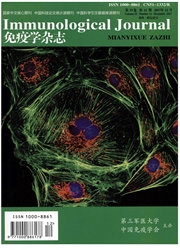

 中文摘要:
中文摘要:
目的检测类风湿关节炎患者血清中4种动物性食物过敏原Ig G和Ig E水平,了解类风湿关节炎与动物性食物过敏原的相关性。方法收集2013年9月至2014年5月深圳市第六人民医院48例类风湿关节患者血清、40例健康人血清。采用酶联吸附法检测血清中牛奶、鸡蛋、虾、鱼4种食物过敏原特异性Ig G和Ig E水平。结果 RA组与正常组血清中鸡蛋特异性Ig G比较有明显差异(P〈0.05);血清牛奶、虾、鱼特异性Ig G,血清牛奶、鸡蛋、鱼、虾特异性Ig E检测无明显差异。老年性类风湿关节炎组(ERA,年龄≥60岁)与非老年类风湿关节炎组(NERA,年龄〈60岁)血清牛奶、鸡蛋、鱼、虾4种食物过敏原特异性Ig G、Ig E无明显差异。结论鸡蛋过敏原可能诱发类风湿关节炎,血清动物性食物过敏与类风湿关节炎发病年龄无明显相关性。
 英文摘要:
英文摘要:
To clarify the relationship between rheumatoid arthritis and animal food allergens, we detected and analyzed four kinds of animal food allergen Ig G and Ig E levels in the serum of patients with rheumatoid arthritis.Total of 48 cases of RA patient serum and 40 cases of healthy human serum were recruited from the Sixth People's Hospital of Shenzhen City from September 2013 to May 2014. The allergen specific Ig G and Ig E levels of milk, egg,fish, and shrimp in serum were measured by ELISA. Data showed that the level of specific-Ig G of egg in RA serum was increased(P 0.05). The specific-Ig G levels of milk, fish, and shrimp and the specific-Ig E levels of milk, egg,fish, and shrimp in the two group of serum showed no significant differences. Furthermore, the specific-Ig G and specific-Ig E levels of milk, egg, fish, and shrimp in serum of elderly RA group(ERA, age≥60 years old) and the non-elderly RA(NERA, age 60 years old) showed no significant differences. Thus we conclude that egg allergy could induce rheumatoid arthritis, but there was no significant correlation between animal food allergy and the age of rheumatoid arthritis onset.
 同期刊论文项目
同期刊论文项目
 同项目期刊论文
同项目期刊论文
 期刊信息
期刊信息
